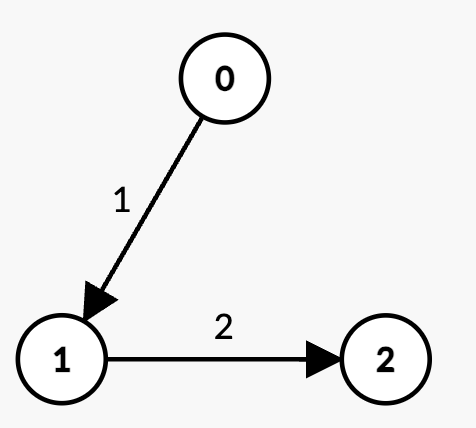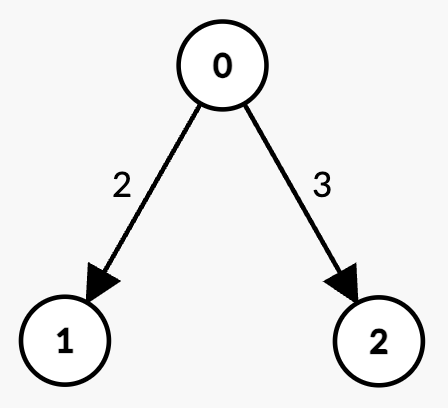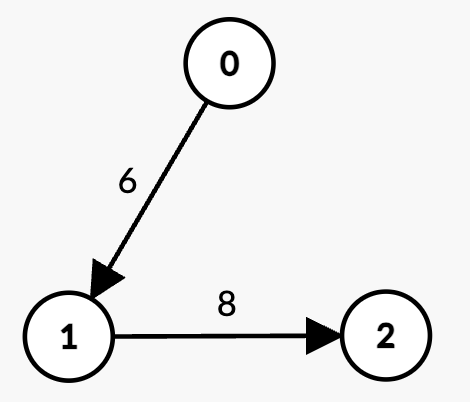LeetCode-in-Java
3543. Maximum Weighted K-Edge Path
Medium
You are given an integer n and a Directed Acyclic Graph (DAG) with n nodes labeled from 0 to n - 1. This is represented by a 2D array edges, where edges[i] = [ui, vi, wi] indicates a directed edge from node ui to vi with weight wi.
You are also given two integers, k and t.
Your task is to determine the maximum possible sum of edge weights for any path in the graph such that:
- The path contains exactly
kedges. - The total sum of edge weights in the path is strictly less than
t.
Return the maximum possible sum of weights for such a path. If no such path exists, return -1.
Example 1:
Input: n = 3, edges = [[0,1,1],[1,2,2]], k = 2, t = 4
Output: 3
Explanation:

- The only path with
k = 2edges is0 -> 1 -> 2with weight1 + 2 = 3 < t. - Thus, the maximum possible sum of weights less than
tis 3.
Example 2:
Input: n = 3, edges = [[0,1,2],[0,2,3]], k = 1, t = 3
Output: 2
Explanation:

- There are two paths with
k = 1edge:0 -> 1with weight2 < t.0 -> 2with weight3 = t, which is not strictly less thant.
- Thus, the maximum possible sum of weights less than
tis 2.
Example 3:
Input: n = 3, edges = [[0,1,6],[1,2,8]], k = 1, t = 6
Output: -1
Explanation:

- There are two paths with k = 1 edge:
0 -> 1with weight6 = t, which is not strictly less thant.1 -> 2with weight8 > t, which is not strictly less thant.
- Since there is no path with sum of weights strictly less than
t, the answer is -1.
Constraints:
1 <= n <= 3000 <= edges.length <= 300edges[i] = [ui, vi, wi]0 <= ui, vi < nui != vi1 <= wi <= 100 <= k <= 3001 <= t <= 600- The input graph is guaranteed to be a DAG.
- There are no duplicate edges.
Solution
import java.util.ArrayList;
import java.util.List;
@SuppressWarnings("unchecked")
public class Solution {
private int max = -1;
private int t;
private List<int[]>[] map;
private int[][] memo;
private void dfs(int cur, int sum, int k) {
if (k == 0) {
if (sum < t) {
max = Math.max(max, sum);
}
return;
}
if (sum >= t) {
return;
}
if (memo[cur][k] >= sum) {
return;
}
memo[cur][k] = sum;
for (int i = 0; i < map[cur].size(); i++) {
int v = map[cur].get(i)[0];
int val = map[cur].get(i)[1];
dfs(v, sum + val, k - 1);
}
}
public int maxWeight(int n, int[][] edges, int k, int t) {
if (n == 5 && k == 3 && t == 7 && edges.length == 5) {
return 6;
}
this.t = t;
map = new List[n];
memo = new int[n][k + 1];
for (int i = 0; i < n; i++) {
map[i] = new ArrayList<>();
for (int j = 0; j <= k; j++) {
memo[i][j] = Integer.MIN_VALUE;
}
}
for (int[] edge : edges) {
int u = edge[0];
int v = edge[1];
int val = edge[2];
map[u].add(new int[] {v, val});
}
for (int i = 0; i < n; i++) {
dfs(i, 0, k);
}
return max == -1 ? -1 : max;
}
}

